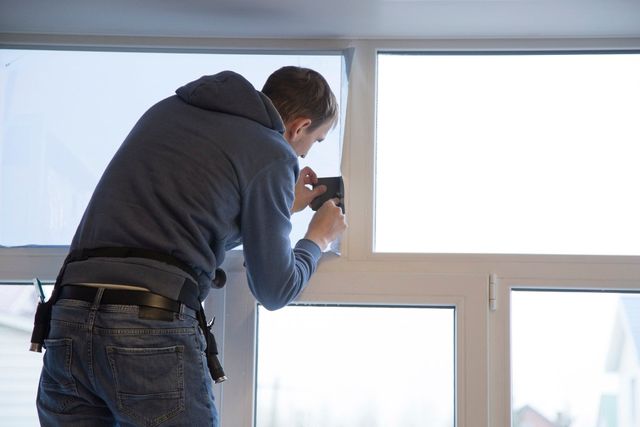Why Residential Window Tint is a Smart Financial Investment for Homeowners
Why Residential Window Tint is a Smart Financial Investment for Homeowners
Blog Article
Exactly How Residential Home Window Tinting Boosts Your Home's Power Performance
Residential window tinting offers a compelling service for house owners looking for to enhance power effectiveness within their living rooms. By using specialized movies to windows, it successfully decreases warm transfer, thereby supporting indoor temperatures and decreasing the requirement for excessive home heating or air conditioning.
Recognizing Window Tinting
Understanding window tinting is essential for house owners seeking to enhance both comfort and power effectiveness in their home. Residential Window Tint. Window tinting includes the application of a thin film to the inside or exterior surface area of glass windows. This movie can considerably modulate the quantity of sunshine and heat that gets in a home, thus influencing interior environment problems
There are numerous kinds of home window tinting films available, each with unique buildings. For example, colored movies absorb solar power, while reflective movies disperse it far from the glass surface area. Ceramic films use an equilibrium of presence and warmth rejection, making them a prominent option amongst house owners. The efficiency of home window tinting is frequently measured by its Visible Light Transmission (VLT) percent, which shows how much light can go through the film.
Benefits of Power Efficiency
Window tinting not only boosts aesthetics but also plays a considerable role in enhancing power effectiveness within household rooms. By minimizing warmth transfer via home windows, colored films create a much more secure interior climate, which can result in considerable reductions in energy usage for heating & cooling. This energy effectiveness translates into lower utility costs, supplying house owners with substantial long-lasting financial savings.

In addition, window tinting improves the comfort of living spaces. By reducing glare and blocking damaging UV rays, tinted windows create a more pleasant atmosphere, which can lead to boosted health for residents. The protection versus UV rays likewise aids maintain furnishings and floor covering from fading, adding to the long life of house products.
Exactly How Tinting Works
Tinting movies run via a mix of innovative materials and technologies made to manage the amount of solar power entering a home. Mainly made up of polyester, these movies typically include metallic or ceramic particles that take in and mirror warmth. This dual ability allows them to significantly decrease the penetration of ultraviolet (UV) rays and infrared radiation while allowing noticeable light to travel through.
The effectiveness of window tinting is measured by its solar warm gain coefficient (SHGC), which shows how much solar energy is transmitted with the window. Lower SHGC he has a good point values are preferable as they signify greater heat denial. In addition, window tints can include a range of tones, allowing property owners to customize their aesthetic preferences while improving energy effectiveness.
In addition, these films act as a barrier, stopping warm loss during colder months by reflecting interior warmth back into the space. This thermal insulation effect enhances the cooling advantages gained throughout warmer months, adding to a balanced indoor climate year-round. By taking care of solar energy properly, domestic home window tinting not only boosts comfort but likewise plays an important function in minimizing power consumption and lowering utility bills.
Selecting the Right Tint

There are numerous kinds of window movies offered, consisting of dyed, metalized, and ceramic. Dyed films are affordable but might have restricted durability. Metalized movies use better warm being rejected but can hinder electronic signals. Ceramic movies provide superb heat control without endangering exposure and are extremely resilient, making them a popular selection.
Noticeable light transmission (VLT) is another essential element, as it suggests the amount of natural light that can pass with the tinted glass. Homeowners must select a tint with a VLT that enhances their lights choices while still providing appropriate glare reduction.
In addition, analyzing the solar warmth gain coefficient (SHGC) can assist figure out just how well a tint can block warmth from sunlight. A lower SHGC shows much better warm control, ultimately improving energy efficiency.
Installment and Maintenance Tips
Appropriate installment and upkeep are essential elements in taking full advantage of the visite site benefits of domestic window tinting. Experts additionally utilize specialized tools and methods, which can improve the longevity and efficiency of the color.
Following setup, upkeep is vital to prolong the life of the window movie. It is suggested to wait at least 30 days prior to cleaning up the colored home windows to permit the sticky to cure fully. When cleaning, use a soft towel and a gentle, ammonia-free cleaner to over at this website stay clear of harming the movie. Avoid rough materials that could scrape the surface.
Dealing with these problems quickly can prevent further damages and keep energy effectiveness. By sticking to these installment and maintenance pointers, homeowners can guarantee their window tinting continues to provide substantial power financial savings and comfort for years to come.
Conclusion
In verdict, property window tinting serves as an efficient service for enhancing power performance within homes. By decreasing warm transfer and obstructing harmful UV rays, window films add to reduce power usage and enhanced indoor convenience.
Window tinting includes the application of a thin movie to the inside or exterior surface of glass home windows. By reducing warmth transfer via windows, colored movies create a more secure indoor environment, which can lead to substantial decreases in energy consumption for home heating and air conditioning.The effectiveness of window tinting is gauged by its solar heat gain coefficient (SHGC), which suggests exactly how much solar energy is transmitted through the window. By managing solar energy properly, property home window tinting not just enhances convenience but also plays an important role in minimizing energy consumption and decreasing utility bills.
By lowering warmth transfer and blocking harmful UV rays, window movies contribute to reduce energy intake and improved interior convenience.
Report this page